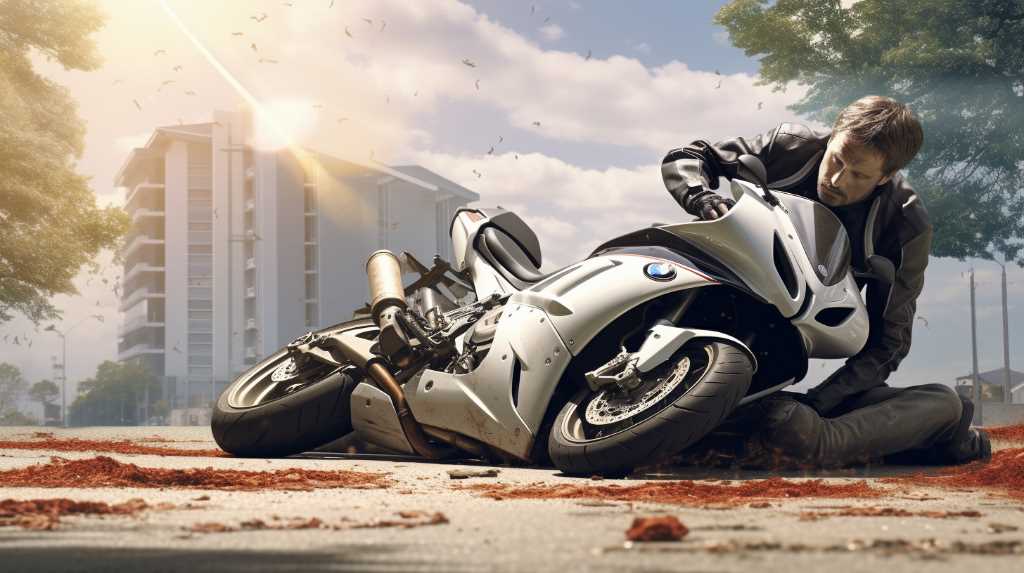
If you’re feeling pain in your kidney area after a motorcycle crash, it could mean you have a serious injury inside your body. If this happens, it’s important to quickly figure out how bad the pain is because it might be a sign that your kidneys or the areas around them are hurt.
You should get medical help right away to find out exactly what’s wrong and get the right treatment. Since your body’s reaction to an injury can change, keep a close eye on how you’re feeling after the crash. Knowing the risks of kidney damage, like blood in your urine or going into shock, is important.
You also need to see a doctor for a check-up after the accident to make sure there’s no hidden damage and to help you heal properly. Taking the right steps after a motorcycle accident can make a big difference in recovery for anyone with kidney pain.
Assess the Pain Severity
Understanding how bad your kidney pain is can help doctors figure out the best way to take care of you after a motorcycle crash. Doctors use tools like the Visual Analog Scale (VAS) or the Numeric Rating Scale (NRS) to measure how much pain you’re in.
Knowing the level of pain can help them decide if you need special scans, like an abdominal CT scan, to check for kidney damage or internal bleeding. If you’re also finding blood in your urine or showing other worrying signs, this information helps doctors decide what to do next.
They might just keep an eye on you, or they may need to do surgery, depending on how serious your injuries are and how stable you are.
Seek Immediate Medical Attention
If you’re hurting in your kidney area after a motorcycle crash, it’s critical to get medical help right away to check for any serious harm or internal bleeding. Because your kidneys are close to your spine and other important parts of your body, an injury could cause issues like blood in your urine, cuts on your kidneys, or even kidney failure.
Doctors will typically have you go through a check-up, a urine test, and a CT scan, which shows a clear picture of what’s going on inside your belly. Getting help quickly can prevent lasting damage and ensure you get the right treatment, which might include surgery if it’s needed.
Medical staff will look at how stable your vital signs are, if you have any other injuries, and how much your kidneys have been affected to figure out how quickly you need care. Waiting too long for treatment can make things worse, which is why it’s so important to act fast.
Monitor Symptoms Post-Accident
After you’ve been checked by a doctor, it’s really important to keep an eye on any symptoms that stay the same or get worse. This can show if your kidney injury from the motorcycle crash is getting better or not.
Look out for blood in your urine, which can be a clear sign of kidney damage. Also, keep track of your blood pressure because high blood pressure can happen after your kidneys are hurt.
If you start feeling more pain on the side of your body where your kidneys are, that’s a red flag and you should see a doctor right away. Write down what’s going on with any symptoms you have—how bad they are, how long they last, and what makes them better or worse.
This helps your doctors figure out the best way to take care of you.
Understand Potential Complications
After a motorcycle crash, it’s important to watch for more serious kidney problems. Injuries to the kidneys can lead to acute kidney injury (AKI), which is when the kidneys suddenly stop working well. If AKI isn’t treated, it can turn into chronic kidney disease (CKD), causing the kidneys to slowly get worse over time.
Also, if you find blood in your pee, it could mean there’s damage to your urinary system, which can make you more likely to get an infection. Cuts to the kidney might cause bleeding around the kidney and scarring, which can raise your blood pressure and make your kidneys work poorly.
It’s really important to catch and treat these problems quickly to avoid lasting damage. Doctors who specialize in kidneys (nephrologists) and urinary systems (urologists) should work together to help you get better.
Follow up With Specialist Care
After initial evaluation and stabilization of kidney injuries from a motorcycle accident, scheduling a consultation with a nephrologist or urologist is a critical step in managing potential long-term complications.
These specialists possess the expertise to conduct a detailed assessment of renal function and structural integrity through advanced diagnostics, such as renal ultrasonography, CT scans, or MRI. They can discern the extent of trauma-induced damage, including parenchymal contusions, lacerations, or vascular insults, and establish a tailored treatment protocol.
The specialist’s monitoring will likely include serial measurements of serum creatinine and glomerular filtration rate (GFR) to gauge renal recovery or progression towards chronic kidney disease.
Ensuring meticulous follow-up care with a renal specialist is paramount for optimizing kidney health and mitigating the risk of enduring renal impairment.
Conclusion
If you’re feeling kidney pain after a motorcycle crash, it’s really important to go see a doctor right away. This is to make sure you don’t have serious injuries like bruises or cuts on your kidneys.
Keep an eye on how you’re feeling, and make sure to do what your doctor says. If they tell you to see a specialist, go for it. It’s the best way to heal properly and prevent any long-lasting problems.
Doctors use treatments that are proven to work and will keep checking on you to help you get better. Remember, taking care of yourself after an accident can make a big difference in your recovery.